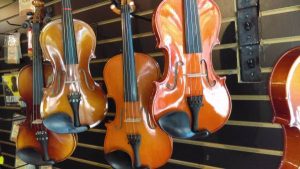By Leon R de Bruin, AARE | Learning music can increase thinking skills, enrich strategies for learning and creativity, and enhance connections across subjects. We keep discovering more reasons to foreground music education in our schools. So why haven’t state governments acted to support music education and reform?
As I see it, music education has now been in the ‘too hard basket’ for at least a generation of Australian students. We continue to suffer a malaise in long-term governmental policy direction.
Lack of funding – heads in the sand
It’s been 14 years since the 2005 National review of school music education “recommended placing a priority on improving and sustaining the quality and status of music education in schools and providing sufficient funding to support effective music education”.
The 2013 Parliamentary Inquiry into the extent, benefits and potential of music education in Victorian schools made 17 recommendations to improve music education in Victoria. A future direction of the inquiry was for the “Victorian Government needing to develop a music education strategy to ensure that all Victorian students can have the opportunity to experience a quality school music education program.” This too remains patently neglected.
The South Australian government is acting on compelling benefits by committing to a four-year strategy of investment and impact for long-term outcomes to lift music education in early-years classes, teacher upskilling and resource development in that state.
Yet, most states endure cuts to music education, and in Victoria government funding of instrumental music education has not improved in over 20 years. The number of schools and students in Australia with no instrumental music tuition available continues to increase.
Many Victorian students in government schools, along with students in other government schools around the country, do not receive a continuous, sequential and developmental music education.
When it comes to music education, there are stark differences in equity between public and private schools, and urban and rural centres nationally.
How music impacts wider domain learning
A growing body of evidence supports the developmental benefits of music learning. Findings from recent neuroscientific research have highlighted the benefits music making has on learners’ brains. It helps develop:
● their capacity to work faster and more efficiently
● ability to tap into multiple skill sets,
● creativity, as well as
● linguistic neural connections between language and music that prime neural networks for learning.
A recent 2019 Canadian study of over 112,000 secondary students found that students who participate in music-related activities – particularly instrumental music between years 7-12 achieved significantly higher scores on science, math, and English exams in high school than non-musical classmates.
So parents’ growing concern with maths and science education, instead of music, may be an ill-considered approach to their child’s schooling. Responding to parental urge to encourage a maths/science or music learning, the study asserted:
… the irony that music education—multiple years of high-quality instrumental learning and playing in a band or orchestra or singing in a choir at an advanced level—can be the very thing that improves all-around academic achievement and an ideal way to have students learn more holistically in schools.
Read more:
● How does music enhance learning?
● Start purposefully and early
This article was originally published on https://aare.edu.au/blog”>EduResearch Matters</a>
Leon R. de Bruin is an educator, performer and researcher in music education, creativity, cognition, collaborative learning, creative pedagogies, and improvisation, and works in the Faculty of Education, Monash University. He is ASME National Vice-President and co-editor of the Brill Publication: Creativities in Arts Education, Research and Practice: International Perspectives for the Future of Learning and Teaching, and co-author of Creativity in Education in the Oxford Research Encyclopaedia of Education
[Our thanks to Josie Quick for contributing this story!]# # # # #
More Top Research Stories:
● Thieves Took This Band’s Trailer – Music Pro Insurance Got Them Back On The Road;
● In the Jungle: Inside the Long, Hidden Genealogy of ‘The Lion Sleeps Tonight’;
● Flying With a Musical Instrument? Tips to Help You Land on a Good Note;
● What’s in a Name? Lady A and Lady ex-Antebellum Say It’s Very Important


